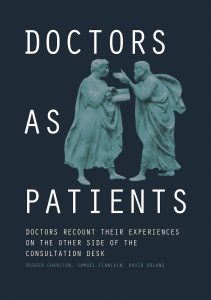 When you were the patient – how was it for you?
When you were the patient – how was it for you?
An ancient Chinese proverb states: “No one can be a good doctor without first having been ill themselves.”
We have recently published a book ‘What’s in a Story? Lessons from reflections in General Practice,’ in which nearly 100 GPs shared stories together with their learning points.
We are now in the process of compiling a book about doctors’ experiences as patients. Although many papers have been written on this subject, we believe this will be the first time a book recounting doctors’ personal experiences as patients, together with what they have learnt from the experiences, has ever been published.
It is planned that the project will be undertaken in liaison with the RCGP and other medical colleges and journals worldwide.
All contributing authors will be acknowledged alphabetically at the beginning of the book with the author’s permission, but in order to maintain confidentiality, authors’ names will not appear alongside the reflections. Please obtain informed signed consent from any person/s referred to in your piece (please see ‘how to download consent forms’ below). If you think you would have difficulty in obtaining consent, or if your submission is of a particularly sensitive nature, please feel free to anonymise your piece so that other parties cannot be identified, whilst maintaining the inherent message of the submission. Alternatively, if you would prefer us to anonymise your reflection, please state ‘requires anonymisation’ at the beginning of the piece.
We would be pleased to consider submissions ranging from a single paragraph to 1000 words.
You may write about any topic(s) of your choice, but here are a few suggestions:
- What it was like to be on the other side of the consulting room desk – things that went really well, and things that didn’t go quite to your liking.
- What qualities, dialogue and rapport do you like to see in a doctor who treats you?
- What it’s like to treat other doctors.
- Did you receive any specific training on treating doctors as patients, and do you have any suggestions on how this topic could be introduced into the curriculum?
- When you were a patient, did you identify yourself as a doctor, and did the consultation change when you did identify yourself as a doctor?
- Do you feel under scrutiny when you treat other doctors, and if so, what techniques do you adopt to make the consultation more comfortable for both you and the patient?
- Did being a patient alter your care of your own patients, and if so, how?
- Did being a patient result in you learning about your presenting illness in greater depth, and if so, did this improve your care of patients with the same condition?
- Have you ever declared to a patient that you have suffered the same condition, and if so, did this have an effect on the course of the consultation?
- Do you treat doctors any differently to other patients?
- When you were a patient, did making suggestions as to diagnosis and treatment help, or did it lead to tensions?
- As a patient, did you feel reticent in making suggestions, or challenging what the doctor said?
- The dangers of self-diagnosis.
- How did you feel when sitting in the waiting room?
- If you waited a long time to see the doctor, did you accept this with equanimity?
- Do you subscribe to the old adage that things always go wrong when the patient is a doctor?
- Did you liaise with other colleagues about your symptoms before the consultation, and if so, did you mention this during the consultation?
- Did you research your own suspected condition on the internet first, and how did the doctor who you saw react to this? How do you feel when doctor patients arrive at the consultation armed with such printouts?
- What was the greatest ‘eye opener’ for you when you were a patient?
Please submit as many entries as you wish. Pieces may be titled or untitled, and may be submitted with or without an accompanying learning point.
All submissions, including anonymised submissions, must be accompanied by a signed author’s consent form, together with ‘other party consent form/s’ (where applicable), and please state whether or not you would like your name to be included in the alphabetical list of authors at the beginning of the book.
For more information, to download consent forms, and to submit a story/stories, go to ‘doctors as patients’ on our website (https://www.whatsinastory.co.uk/blank-page-1).
David Orlans, Rodger Charlton, and Samuel Finnikin





